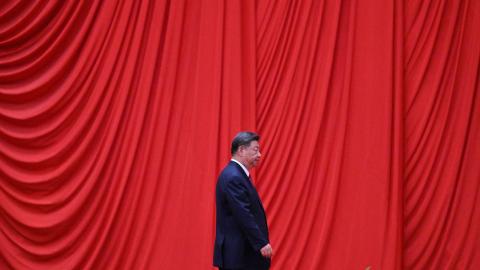The Trump administration has so far focused its efforts on ending ongoing wars, so this year's troubling developments in the Western Pacific have remained on the back burner. China has not launched a war against any of its neighbors, but its pressure on Taiwan is relentless. The island democracy's coast guard patrols around the clock to prevent Chinese ships from severing the underwater internet cables that connect it to the outside world. Chinese ships and planes continue to prowl around Taiwan.
These maneuvers place enormous stress on the Taiwanese military. They also contribute to a larger campaign to convince the Taiwanese people that further resistance is pointless and to submit to Beijing's rule. China is on the brink of suffering an embarrassing setback in that campaign though, one that reveals a serious problem for its diplomatic strategy and an opening for Washington to exploit.
Diplomatically isolating Taiwan is a top priority for Beijing. It blocks Taiwanese participation in multilateral bodies, such as the World Health Organization, because it claims Taiwan is a province of mainland China. Similarly, it pressures and cajoles the countries that maintain formal diplomatic relations with Taiwan to drop those ties. Since 2016, Taiwan has lost formal relations with 10 such countries. Only 12 remain.
Some question the validity of U.S. concerns about this issue. Jimmy Carter downgraded American relations with Taiwan to placate China four and a half decades ago, so in that sense, Taiwan's former friends follow in Washington's footsteps. This is a fair point, but many of the countries that still maintained ties with Taiwan in 2016 were U.S. allies. Shifts by America's friends toward its foes are usually bad for Americans.
China's isolation plan has hit a snag, however. In 2023, Honduras broke ties with Taipei and upgraded its relationship with Beijing, and it has gotten nothing but trouble in return. Educational exchanges with Taiwan stopped abruptly, and the economic benefits from China have yet to arrive. Honduran exports to China in 2024 were less than one-tenth of Taiwanese imports from before the diplomatic about-face.
Presidential frontrunner Salvador Nasralla estimates that the shrimp industry alone has lost tens of thousands of jobs due to collapsing demand from Taiwan, and he observes that other Central American countries never received China's promised goodies. His solution? Rebuild ties with Taiwan.
Losing Honduras would be a massive embarrassment for China, both because it would highlight Beijing's spotty track record of delivering on easily fulfillable commitments and because aspiring superpowers look weak when defied by small states. A Honduran reversal would dismay the Chinese Communist Party and hearten the Taiwanese. But regardless of the outcome in Honduras, the ongoing debate there reveals how China's economic strategy undermines its diplomatic strategy.
The Chinese market is losing its attractive power. For decades, foreign companies have run headlong into China as they chased riches. High-tech American corporations like Apple and Tesla plowed enormous sums into China; the German auto industry made similarly consequential bets. But the Chinese Communist Party never intended to let foreign companies dominate the Chinese market. The Hondurans are not the only foreigners who have bet heavily on China only to lose out in the end.
China's heavy emphasis on exports, moreover, creates headaches for other countries. Some Honduran sellers were disappointed by low Chinese orders; others were overwhelmed by the flood of incoming Chinese goods. Buying cheaper goods is one of the most straightforward ways to increase standards of living, but that only works if people still have jobs. Despite the German auto industry's fear of offending China, the European Union imposed severe tariffs on Chinese cars last year.
This should create a strategic opportunity for the United States. If cooperation with China appears to be a losing proposition, Beijing's diplomacy will suffer. During the Cold War with the Soviet Union, the textbook American play was to reward friendly countries by increasing their access to American markets. But after the failed attempt to change Chinese and Russian politics through trade, that strategy is off the table. There is not much appetite among Republicans or Democrats for new free trade agreements.
American strategists will need to get creative about the economic competition with China. This administration is on the lookout for rare earth minerals and the other building blocks for cutting-edge technologies, such as data centers for artificial intelligence, and is open to siting them outside the United States. Initiatives like Reihan Salam's Medicare-in-Mexico or Walter Russell Mead's "regional retirement program" could help America's seniors and their southern neighbors at the same time.
Marxists have mistakenly announced the arrival of late-stage capitalism and its imminent collapse many times before. This time, however, it's the Marxists who suffer from internal contractions. Washington should heighten those contradictions.

















